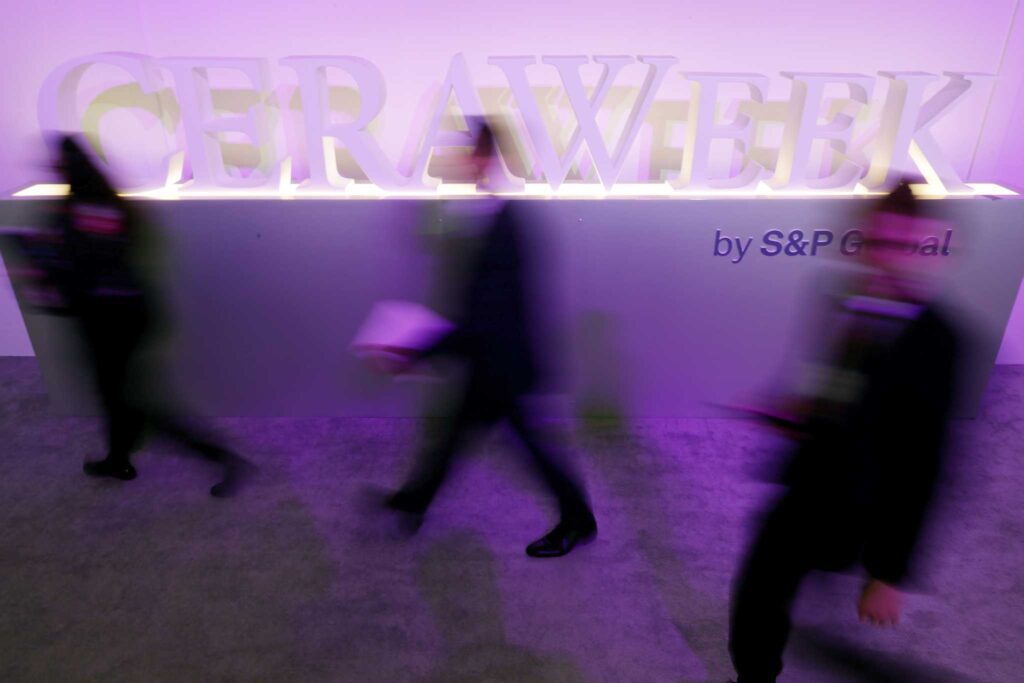As downtown Houston teems with crowds attending the annual CERAWeek conference, its organizers expect new faces and a new genre of conversation around an industry-wide hot topic: climate change.
S&P Global Commodity Insights, which runs the conference from March 18-22, created an independent Climate Hub last year within the event’s energy innovation and emerging technologies program, known as Agora. The Climate Hub boasts 40 sessions this year, up from 32 in its inaugural year.
Climate interest picked up among industry leaders following new U.S. incentives for clean tech and the move toward emissions caps and tariffs in Europe and other key markets, while world leaders are fresh from a slew of new commitments made at the COP28 climate conference in November.
Article continues below this ad
“This is one of the first opportunities, really, since COP28 to have these policy and technology discussions at a high level,” said Ken Downey, executive director of CERAWeek’s Innovation Agora. “I think there’s big momentum coming out of COP.”
Among other changes, the hub’s schedule will focus far more on climate science this year, offering panels by top researchers as well as policy and industry experts.
“I’ve noticed the growing attention to climate and the clean energy transition at CERAWeek over the years,” said David Sandalow, a fellow at Columbia University’s Center on Global Energy Policy and former Department of Energy regulator who will speak on two Climate Hub panels this year — one on generative AI and the other on U.S.-China relations.
CERAWeek climate panelist Bryan Fisher is now managing director of the sustainability consulting firm Rocky Mountain Institute, but wore industry shoes for years as an oil and gas executive, power investments leader and energy business consultant. He said the spike in interest in the climate within the conventional energy sector has been spurred by Inflation Reduction Act incentives, but would make sense regardless.
Article continues below this ad
“Think of carbon and hydrogen, those are molecules, just like fossil fuels are. The expertise lies in a lot of traditional companies,” Fisher said, though he added that newer green tech specialists also have their share of the space.
Fisher will speak on a panel about carbon transport and storage, one of the central topics for this year’s Climate Hub.
“We have a number of sessions around carbon markets and carbon policies, especially with (the Carbon Border Adjustment Mechanism) coming into effect in Europe,” said Ash Singh, the head of energy transition program management for S&P Global who is heading up Agora’s hub programming.
Other climate topics on the roster include oceans-focused panels looking at sea-driven climate mitigation and the “blue economy.”
Article continues below this ad
“The climate affects everything,” Singh said, including risk management and planning for stakeholders with traditional oil and gas operations.
Matt Watson, who leads the Environmental Defense Fund’s industry transition work, has had a front-row seat for the shift.
“We’ve been participating in these industry gatherings for many years, and have typically been the only environmental group in the room. That’s starting to change,” Watson said. “Attention to climate impacts has become table stakes for the industry, it’s something that can no longer be ignored.”
Article continues below this ad
Last year, CERAWeek had about 3,000 registrants for the Agora program out of 8,500 conference attendees, while a couple thousand entrants with general passes came to Agora panels. Downey said that in advance of this year’s conference, registration for the climate-filled innovation section is outpacing the standard set by CERAWeek 2023.




